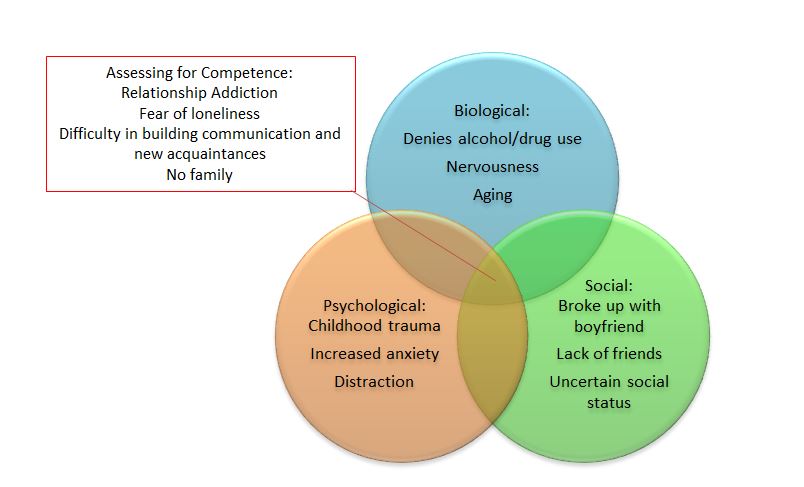Biological
Biological variables include the gender of the patient, namely female, the age of the patient, which is forty years old, as well as the absence of children. Previously, the girl was successful, led a healthy lifestyle, contacted people, and had a boyfriend. After the breakup, she began to feel differently, closed herself off from friends, spent more and more time at home, and became overly worried about spending money. Problems began to appear at work, which in turn provoked fatigue. However, it did not affect changes in weight, sleep, and psychomotor activity. That is, biological variables in this case can be understood as gender, age, hobbies and aspirations of the patient (Mundia et al., 2017). For the most accurate picture of biological variables, there is not enough history of psychological deviations or characteristics of Felicia’s parents.
Social
As social variables, it can be highlighted that the girl was previously active in contact with people, and now she is closed to the outside world. Felicia is not married and has no children, which is also a social variable. Currently, she does not have a certain social status, as she has limited her communication with friends colleagues and broke up with her boyfriend. Felicia has practically no social support, as she does not communicate with people. It can be noted that the girl experiences loneliness after parting with a loved one. Probably it was the parting that led to the fact that the girl absolutely abstracted from her social connections. In addition, she began to be afraid of the environment outside the house; namely, she saw the dangers and insecurity of society. Termination of communication with people and society as a whole can also lead to certain psychological disorders (Mundia et al., 2017).
Psychological
For the first time, the patient’s problems began at an early age, after psychological trauma due to the divorce of her parents. After that, the girl started to strive to be closer to her native people, which her mother clearly noticed. As a child, the girl noticed that she was restless. At present, she has become afraid of evening walks excessive monetary expenses and also began to make mistakes in the workplace regularly. These changes started to occur after Felicia, and her man decided to break up after a long relationship. After the breakup, the girl notes that she does not tend to commit suicide and does not consider herself guilty of what is happening to her. Psychological variables are understood as the influence of stress, family circumstances, changes in personal life.
Assessing for Competence
Felicia constantly had a boyfriend and was very upset by the divorce of her parents, which indicates a strong dependence on relationships. She is filled with the fear of loneliness since once she had already encountered a similar example from her parents. As a result, she can hardly control herself in a situation where she is constantly alone – she needs a safe place where external threats are minimized. Only with the presence of a person nearby can she lead an active, healthy social life, make acquaintances and keep in touch with friends. Without a family, without the support of a loved one, Felicia is in a stupor, anxiety and nervousness increase, and, as a result, absent-mindedness. To overcome this problem, the patient needs to learn to get along with herself, value herself and trust herself in the conditions of the surrounding external world. The resulting diagram based on the analysis is shown in Figure 1.

Reference
Mundia, L., Mahalle, S., Matzin, R., Zakaria, G., & Abdullah, N. (2017). Sociodemographic variables and social values: Relationship with work-attendance problems in Brunei public- and private-sector employees. Neuropsychiatric Disease and Treatment, 13(1), 2307-2319. Web.